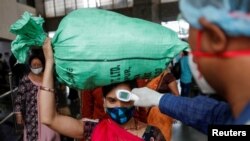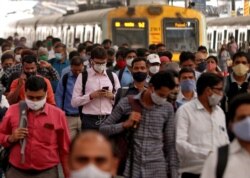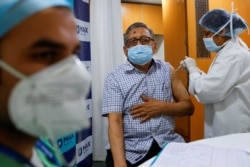Indian Prime Minister Narendra Modi has called for "quick and decisive steps" to immediately halt an emerging second wave of the COVID-19 pandemic in the country.
Cases have spiked in recent weeks after a consistent decline that had raised hopes that the pandemic was retreating in India, which has counted the most cases after the United States and Brazil.
With nearly 29,000 new infections Tuesday, India reported its highest single-day numbers in the last three months.
Health authorities say the surge is not being driven by mutations of the virus as in some Western countries. They blame poor adherence to protocols such as wearing masks in a country where markets are buzzing, and restrictions have been lifted in public places such as temples, restaurants and cinema halls across much of the country.
There is a silver lining — most of the new cases are confined to a handful of states, with the western state of Maharashtra emerging as the epicenter of new infections.
"If we don't stop the pandemic right here, then a situation of nationwide outbreak can get created," Modi cautioned Wednesday in a virtual meeting with chief ministers of states. "The self-confidence that we gained in our corona(virus) fight should not turn into overconfidence. Our success should not be the reason for carelessness."
Authorities in Maharashtra, one of the country's most urbanized and economically developed states, began reimposing curbs this week. One of the state's big cities, Nagpur, has been locked down for a week. Cinemas, hotels and restaurants have been ordered to limit guests to half capacity until the end of the month.
Health officials in Mumbai, the state capital, said that most of the new cases are in the working age group of 20 to 40 years.
"The rise in cases is a matter of serious concern," V.K. Paul, head of a government committee on medical emergency preparedness, said at a press conference. "But we don't need to panic. We have tools to handle the situation. We need to reenergize the test, track and treat strategy that helped us bring the pandemic under control."
Health experts are urging quick measures to check the rising cases.
"It's a mixed bag right now. The second wave is already there in some places, but not everywhere," said virologist Shahid Jameel. "But neither the severity of the disease nor the mortality rate has increased."
But India's rising caseload worries health officials.
"It is very important for us to really tighten controls again. We should not allow the second wave to rise," said K. Srinath Reddy, head of the Public Health Foundation of India. "The whole urgency with which resumption of economic activity has been pursued led to a feeling that we are seeing the end of the pandemic. So, there has been a slackening of measures put in place to control the virus."
Virologists say it is uncertain how much new coronavirus mutants may be driving the surge.
"At this point, we have no evidence to incriminate mutants. They may have contributed to some extent, but without more testing, we really don't know that," Reddy said.
Experts are also urging India, the world's largest vaccine producer, to hasten the pace of its nationwide inoculation program. In the last two months, India has given jabs to about 35 million people. But although the pace is accelerating, it could still take months to cover India's populous cities.
"Everyone vaccinated will improve the situation. As the old saying goes, vaccines don't save lives, vaccinations do," said Jameel.






